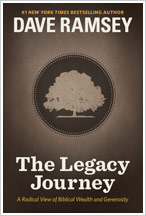The Legacy Journey
By Dave Ramsey
Review By Casey Fedde
Categories: Abraham and Sarah, Bible Study, David, Inspirational People, Isaac and Rebekah, Jacob and Esau, Job, Motivational, Solomon, Spiritual Living Money. It's a touchy subject. Conversations about it are filled with divisive words – haves and have-nots, rich and poor, spenders and savers – and they're often fueled by emotions such as condemnation, greed, and envy.
 So it's no wonder that money is the root of all evil. Wait, money is what? Actually, "For the love of money is a root of all kinds of evil," according to the Bible (1 Timothy 6:10). Financial author and talk-show host Dave Ramsey breaks this down even further in his new book, The Legacy Journey. "It's not about the money," he says. "It's about our attitude" (p. 18). And it's time we altered our attitudes on money, especially on wealth and the wealthy. So it's no wonder that money is the root of all evil. Wait, money is what? Actually, "For the love of money is a root of all kinds of evil," according to the Bible (1 Timothy 6:10). Financial author and talk-show host Dave Ramsey breaks this down even further in his new book, The Legacy Journey. "It's not about the money," he says. "It's about our attitude" (p. 18). And it's time we altered our attitudes on money, especially on wealth and the wealthy.
Wealth is at the heart of The Legacy Journey. Obviously, wealth is that not-so-secret ingredient of an inheritance for the next generation. The book certainly outlines practical ways to save money; but to learn more about the nature of true wealth, Ramsey turns to a familiar source: the Bible. Finances are personal, and there's nothing more intimate than consulting the Scriptures and talking finances with God.
"What does the Bible really say about money?" Ramsey asks. "How much does God expect you to give to others? How does wealth affect your friendships, marriage, and children?" The answers to these questions lie with Abraham and his son Isaac, Job, and Zacchaeus. Lessons can be found in the story of the rich man who trusted equal shares of his wealth to three servants (see the Parable of the Talents, Matthew 25:14-30) and the farmer who seriously stockpiled his harvest until he ran out of space in his barn (see the Parable of the Rich Fool, Luke 12). But Ramsey cautions to "not take these amazing stories for granted. Dig in for yourself, read the passages ... and study commentaries" (52).
Ultimately, "Scripture shows us that godly families are called to manage wealth for God's glory" (141). No ifs, ands, or guilt. To do this, according to Ephesians, "You work, you earn, you give" (4:28). And by teaching others to do the same, a legacy is created.
Teaching others, influencing their actions, is key to building a lasting legacy – as an individual, a couple, a family, and a friend or family member. One of Ramsey's evergreen tips is finding a financial adviser with the heart of a teacher – someone to trust and learn from – and the Bible is the ultimate teacher. By seeking a biblical insight to wealth, it becomes evident that a legacy isn't just wads of cash; it's also "an inheritance ... of love, time, attention, and resources" (109). So "don't just pass along wealth to future generations," Ramsey says. "Also pass along the responsibility for managing it..." (145). Look at Solomon. As the son of a king, he inherited more than his dad's money; he received King David's responsibility as well. Solomon was handed the responsibility to build a temple. And he was prepared, in spirit and in wealth.
Living – and leaving – a legacy also hinges on attitude. This is what Ramsey calls The Law of Great Gain. Contentment is "the most powerful financial principle there is," he says (59). And here's the kicker: "contentment is not a destination; it is a manner of traveling" (61). Achieving a biblical view of wealth and generously giving is a trip worth taking.
Creating a legacy is a journey, mentally, spiritually, and financially, and Ramsey's new book is a welcome travel guide.
"The Legacy Journey" by Dave Ramsey, Ramsey Press, 237 pp. |